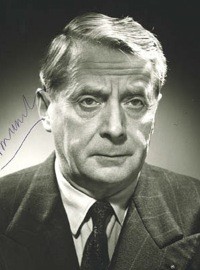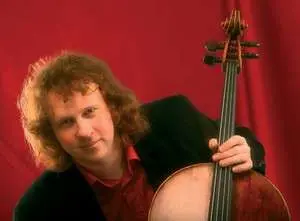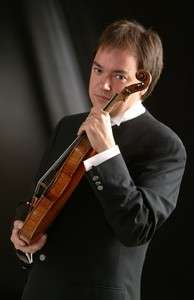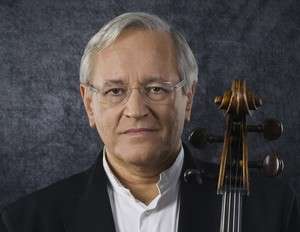
Charles Munch |
Charles Munch

Only in adulthood, when he was about forty years old, did Charles Munsch become a conductor. But the fact that only a few years separate the artist’s debut from his wide popularity is not accidental. His entire previous life from the very beginning was filled with music and became, as it were, the foundation of a conductor’s career.
Munsch was born in Strasbourg, the son of a church organist. All of his four brothers and two sisters, like him, were also musicians. True, at one time Charles was conceived to study medicine, but soon he firmly decided to become a violinist. Back in 1912, he gave his first concert in Strasbourg, and after graduating from the gymnasium, he went to Paris to study with the famous Lucien Capet. During the war, Munsch served in the army and was cut off from art for a long time. After demobilization, in 1920 he began working as an accompanist of the Strasbourg Orchestra and teaching at the local conservatory. Later, the artist held a similar post in the orchestras of Prague and Leipzig. Here he played with such conductors as V. Furtwangler, B. Walter, and for the first time stood at the conductor’s stand.
In the early thirties, Munsch moved to France and soon emerged as a gifted conductor. He performed with the Paris Symphony Orchestra, conducted the Lamoureux Concertos, and toured the country and abroad. In 1937-1945, Munsch conducted concerts with the orchestra of the Paris Conservatory, remaining in this position during the occupation period. In difficult years, he refused to cooperate with the invaders and helped the resistance movement.
Shortly after the war, Munsch twice – first on his own and then with a French radio orchestra – performed in the United States. At the same time, he was invited to take over from the retiring Sergei Koussevitzky as director of the Boston Orchestra. So “imperceptibly” Munsch was at the head of one of the best orchestras in the world.
During his years with the Boston Orchestra (1949-1962), Munsch proved to be a versatile, widely erudite musician of great scope. In addition to the traditional repertoire, he enriched the programs of his team with a number of works of modern music, performed many monumental choral works by Bach, Berlioz, Schubert, Honegger, Debussy. Twice Munsch and his orchestra made large tours of Europe. During the second of them, the team gave several concerts in the USSR, where Munsch later performed again with Soviet orchestras. Critics praised his art. E. Ratser wrote in the Soviet Music magazine: “The greatest impression in Munsch’s concerts remains, perhaps, from the influence of the artist’s personality itself. His whole appearance breathes calm confidence and at the same time paternal benevolence. On the stage, he creates an atmosphere of creative emancipation. Showing firmness of will, demanding, he never imposes his desires. His strength lies in selfless service to his beloved art: when conducting, Munsch devotes himself entirely to music. The orchestra, the audience, he captivates primarily because he himself is passionate. Sincerely enthusiastic, joyful. In him, as in Arthur Rubinstein (they are almost the same age), the youthful warmth of the soul strikes. The real hot emotionality, deep intellect, great life wisdom and youthful ardor, characteristic of the rich artistic nature of Munsch, appear before us in each work in new and new shades and combinations. And, really, every time it seems that the conductor has exactly the quality that is most necessary when performing this particular work. All these features are most clearly embodied in Munsch’s interpretation of French music, which was the strongest side of his creative range. The works of Rameau, Berlioz, Debussy, Ravel, Roussel and other composers of different times found in him a subtle and inspired interpreter, able to convey to the listener all the beauty and inspiration of the music of his people. The artist was less successful in close-up classical symphonies.
In recent years, Charles Munch, leaving Boston, returned to Europe. Living in France, he continued active concert and teaching activities, enjoying widespread recognition. The artist owns an autobiographical book “I am a conductor”, published in 1960 in Russian translation.
L. Grigoriev, J. Platek





